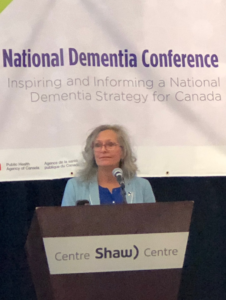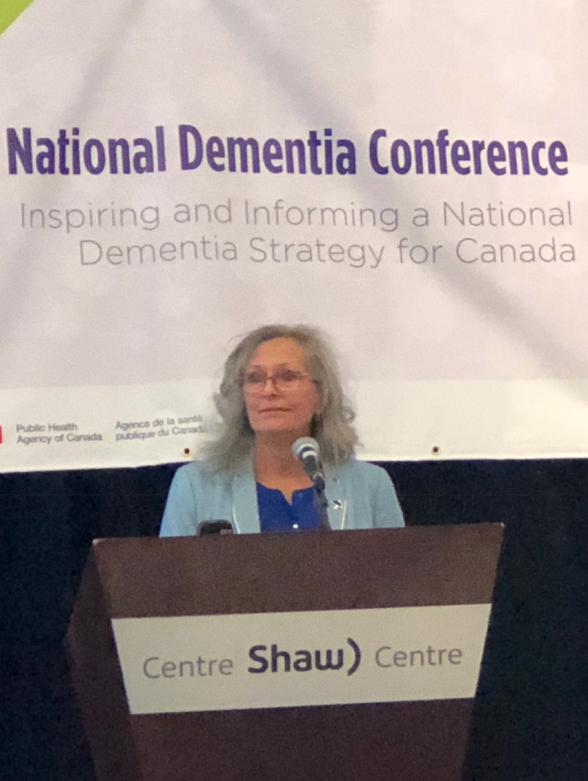 It has been a few weeks since the Canadian National Dementia Conference held in Ottawa May 14 & 15th 2018, and although belated, we are posting the excellent speeches given by two of the co-founders of the Ontario Dementia Advisory Group (ODAG).
It has been a few weeks since the Canadian National Dementia Conference held in Ottawa May 14 & 15th 2018, and although belated, we are posting the excellent speeches given by two of the co-founders of the Ontario Dementia Advisory Group (ODAG).
We are very proud they are also DAI members; Phyllis Fehr is a DAI Board member, and Mary-Beth Wighton who is the current Chair of ODAG, and along with Jimm Mann, is a full member of the Canadian Ministerial Dementia Advisory Group.
Today, we are publishing Phyllis's speech, and tomorrow, Mary-Beths. To say the people living with dementia in Canada are ahrd at work is an understatement, and we congratulate and applaud them all as they work together to ensure the Canadian Dementia Strategy is fully embedded with human rights. Yes, their human rights.
Phyllis Fehr's Inspirational keynote speech:
Good morning everyone. How are you this morning? Are you all excited to be here? Are you ready to join me in getting down to work?
First a few THANK YOU's are in order.
Thank you, Public Health Agency of Canada for taking on the Daunting task of planning the first-ever Canadian dementia strategy conference. You have remained dedicated and worked hard to make this conference a reality. I thank you for inviting us to participate.
It is a great honour for me to be here, today.When I say this, I think of the Number of people invited to be in this room -around 150 invited guests. You could have chosen any one of the
36,290,000-people living in Canada. Yet, here WE are.
For people living with Alzheimer’s and dementia this is very important because there are 564 thousand people living in Canada with a form of dementia and there are about 25 of us in this room.
I see some familiar faces in this group, those of you I have not met yet, I am hoping to get a chance to meet you over the next couple of days.
To begin, I’ll tell you a bit about myself.
My name is Phyllis Fehr. I worked as an ICU RN until I developed younger-onset dementia. At the age of 48, I started to see some typical early signs, such as misplacing things and forgetting appointments. It wasn’t till I was 53 that I received a firm diagnosis, after going through a two-day battery of testing.
I will never forget that day or maybe I will, but I feel like it has been branded in my head. You see on that day we were escorted into the gerontologist’s office.
Once she entered the office, I felt like I no longer existed.
She looked at my husband and spoke to my husband. As far as she was concerned, I was not there. She told him that I had “early”-onset Alzheimer’s and that I was still doing well. She instructed him to bring me back when I couldn’t dress myself.
I couldn’t say a word! I was in shock. First, I’d been given a diagnosis of a terminal disease. Yes, I was a health professional and aware. Yes, I was ready to hear the diagnosis.
But she treated me with disrespect. She ignored me. One day, I’m functioning and the next moment, I am diagnosed with Alzheimer’s and have immediately lost all capacity? That experience really bothered me. So, I requested my neurologist to refer me to someone else.
For nine months, while I waited, I became with drawn. I did not want to be involved. That first gerontologist left a disabling impression upon my being. I lost all confidence in knowing anything. She actually broke my will to continue on.
The referral took a while, but it was worth my wait. This new doctor, spoke to ME.
She seemed to understand what I was going through. She supported me and encouraged me. This made a world of difference to how I thought about dementia. She gave me back my person hood, she gave me back my will to go on, she turned me into the person you see today, the person who goes out and advocates for dementia, advocates for change.
I have regained my voice, I have regained my confidence.
I am involved again, not just in advocacy and public speaking, I’m involved in research, I am a test subject and I am a researcher. It may be hard for me but I can still do it. I sit on a group called the voices group, we help research from our lived experiences and we are respected.
Today, I realize I still have my intelligence. I just need to access it, differently. I still have all my educational experience. I am still ME.
In truth, my dementia journey began much earlier than age 48. It began when I was 13.
My grandmother came to live with us because she had Alzheimer’s. Years later, my mother was diagnosed with dementia. What a different world we live in today, compared to in the 60s and 90s.
I will end my journey with a story. In our family we are very open and honest about dementia we don’t hide. We educate ourselves about it including the little ones. Not like when my mom and grandmother had it and it was hidden. My four year old grandson has developed stuttering and he attends speech and language classes.
A couple of weeks ago while there they were doing the education around stuttering and the pathologist took down the mannequin and open it up, so he could see the brain, lungs etc and she explains how it is the signal from the brain that makes you talk and how his signal is getting mixed up. My grandson looks at the mannequin; deep in thought, when he looks up he looks across the room at his mom and yells “mom I know what’s wrong with nanny, her signals get mixed up just like mine. Out of the mouth of a 4 year child.
Over the next two days we are going to hear and have a chance to give our input on a number of different topics relating to Alzheimer’s and dementia.
Things are changing. More people are growing aware, of what it means to live with dementia. Today, we’re working together to make Canada a better place for people living with dementia - to live and not hide.
For those of us who are here representing people with lived experience, we feel an urgency to do this work. This is because we are all aware that this disease is terminal, we know the different stages that we will go through. What we don’t know is when, or how long we have before the decline starts. That is why we feel that this is such an urgent matter.
We are also well aware that there are many others in Canada who will continue this work where we leave off. I am living with what I call the roller coaster of dementia. I have high times when I function well, i have low time when it is hard to function or think, i even have moments when I are totally derailed.
But I dust myself off and get back on that track maybe a little worse than when we derailed but i keep going. We just don’t know when the day will come that we won’t be able to get back on the track. This is why we all work so hard to make these changes so that in the future other may have a smoother ride. The other side to this is that we have to take into consideration is age and other co-morbidities. We are learning that this is not just a disease of the old.
I don’t know about you, but when I looked at the program for the conference and knew I could choose only one topic in each of the three dialogue sessions, it was hard deciding.
There’s so much work that needs to be done so much work that people with dementia need to have input into. I think this is just the start.
I would also like to Thank you, Laura, Mary Beth, Tammy and Lisa for presenting the preconference workshops.The information you shared will make this conference easier to navigate and help educate us on each dialogue session so that we can better choose which sessions best fit our individual needs.
The people in this room today represent the 10 provinces and 3 territories in Canada. We have worked to help bring about change for those living with dementia, whether it is in our community, province, or country. The next two days of work will empower us with stronger voices and will give us more solid ground to stand upon.
What we learn here, will help us implement the changes necessary for people living with dementia in Canada.
Are you ready to join me… to roll up your sleeves, and get to work?
Together, we can make the changes for people with dementia to live well with this disease.
Together we will build a world-class national dementia strategy for Canada!
I could go into some of the topics that we will be discussing but I leave that to the other experts that have joined us here, today and tomorrow
In closing I leave you with a quote from Anne Lamott. She once said “Hope begins in the dark, the stubborn hope that if you just show up and try to do the right thing, the dawn will come. You wait and watch and work: you don't give up.” So, I feel that we have waited, watched and worked, and today the dawn begins for dementia in Canada.
Let’s work together.
